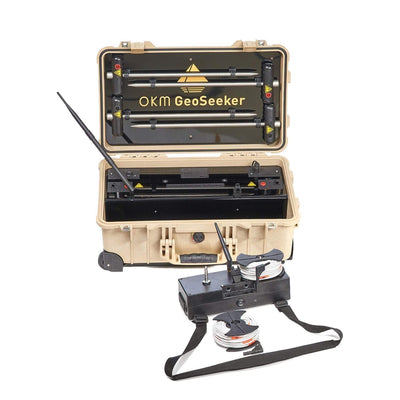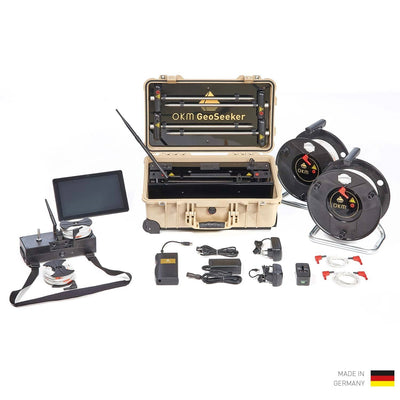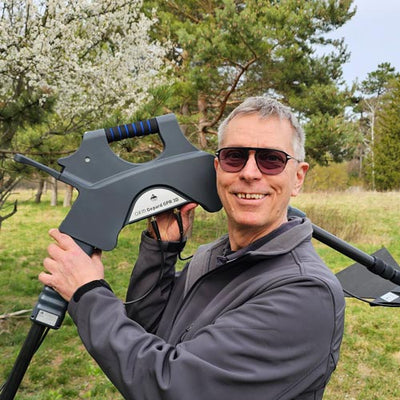Water Detector for depths down to 100 m (328 ft) OKM GeoSeeker Mini
- Geoelectric water and cavity detector: Determines the ground resistance down to a depth of 100 m and visualizes the measured values in 2D
- Detection depth: With this technology customers found water down to 100 m (328 ft) deep
- Use cases: Water detection, cavity detection, geotechnical engineering
- Operating modes: Geoelectrical scan
- Detectable structures: Water deposits, water-bearing gravel, cavities
plus VAT, shipping and fees





Geoelectrical Measuring Procedure
2D Visualization
Multilingual Operation
Color Display / Touchscreen
Internal Memory
Rechargeable High-Capacity Battery
Water detector and cavity detector down to 100 meters (328 ft) depth
Like the water detector OKM GeoSeeker, the GeoSeeker Mini utilizes a geoelectrical measurement procedure based on Schlumberger. The water detector – that can also be used to detect underground cavities – determines the soil resistivity. Based on that apparent resistivity of the ground the detector is able to detect underground water resources like fresh water, drinking water, water-bearing gravel and groundwater level.
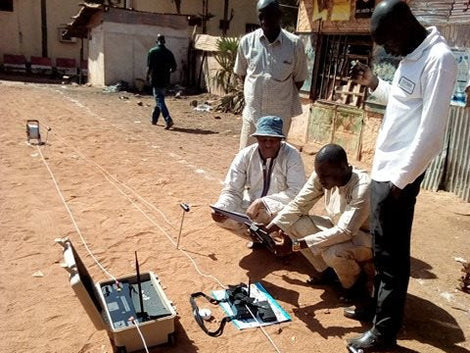

Water detector OKM GeoSeeker was handed over in December 2017 to "Aktion Pro Afrika" - a nonprofit organization - and already provides successful measurement results during the search for underground ...
Read moreBased on the fact that underground water has a very good conductivity, you can conclude that very bad conductivity is a hint for hidden cavities like caves, tunnels, chambers and underground rooms. Thus, the geophysical detector GeoSeeker Mini can be deployed as water finder and cavity detector at the same time.

Operating the water and cavity detector GeoSeeker Mini
The water detector GeoSeeker Mini is operated via touchscreen. Select the measurement depth as well as the amount of scanning points and simply follow the graphical instructions. Due to easy-to-understand images and icons, the GeoSeeker Mini is multilingual by using pure picture language.


During the measurement the electrodes have to be replaced several times to measure the ground resistivity at certain places. All instructions can be read from the color display, where the results are presented after each single scan. At the very end of a measurement the final result is shown as a graphical 2D scan image.
Data visualization of water resources and cavity
After finishing a geoelectrical measurement, the final result is calculated to generate a representative 2D scan image of the underground resistivity. With the pictograms in the lower display area, users can read directly the diagram: The colors in the scheme indicate water deposits (blue with water drops) and/or detected cavities (red with tunnel symbol).


Depending on the selection of the size and depth of the measurement, the display contains several columns and is provided with corresponding depth information.
Using the left button (water drops) and the middle button (tunnel entrance), the user can switch to simplified representations of the measurement results.




Thanks to the realization of step-by-step instructions and results in simple images and pictograms, the GeoSeeker Mini is language-independent. That means, the water detector can be used by inexperienced users all over the world – no matter what language they speak.
Geoelectrical applications with GeoSeeker Mini
The geoelectrical detector OKM GeoSeeker Mini can be used to detect underground water resources as well as hidden cavities. Both structures can be located due to its specific characteristics of electrical resistivity.
Water detection
Underground water resources have a good electrical conductivity and measuring its resistivity will result in low apparent resistivity values. The capability of water detection is very useful for
- dowsers, water finders
- well builders, drilling companies
- agriculture, fruit growing
- mining, building contractors
Detectable subsurface water deposits could be
- ground water level
- fresh water, drinking water
- underground watercourse, water veins
- underground water streams, headwaters
Cavity detection
Hidden cavities and hollow spaces have a rather poor electrical conductivity and measuring its resistivity will result in high apparent resistivity values. The capability of cavity detection is useful for
- archaeologists, historians
- treasure hunters
- geotechnical engineering
- military services
- building contractors
Detectable subsurface cavities could be
- caves, tunnels
- galleries and manholes
- chambers, sepulchers, tombs
- bunkers, vaults, cellars, rooms
Water Detection / Well Building
Geotechnical Engineering
Cavity Detection
Agriculture
Archaeology
OKM Search Services
| 1x Control Unit |
| 4x Electrode |
| 2x Power Cable Drum (Ø 290 mm) |
| 2x Voltage Cable (10 m) |
| 2x Connecting Cable (2 m) |
| 1x Power Pack PP20V3A01 |
| 1x Charger with charging cable |
| 1x Travel Adapter Set |
| 1x Waterproof and shock-resistant Protector Case |
| 1x Quick Start Guide |
The actual scope of delivery is subject to technical developments or specific model configurations and can differ from depicted components.
Control unit
- Dimensions (H x W x D): 410 x 340 x 180 mm
- Weight: 4.5 kg
- Input voltage (max.): 11 – 13 V DC / 30 W
- Display: 3.5” Resistive touch, 480 x 320 Pixel
- Display CPU: Cortex M3, 32 MHz, 128 KB RAM
- Data memory: 4 GB
- Sample rate: 4096 Hz (64-fold oversampling of 512 values)
- Operating time: approx. 6 – 8 h
- CPU: 80 MHz Cortex M3
- ADC: 16 bit
- Effective Range: (differential) –1400 to +1400 mV
- Measurement Period per Scan Point: min. 16 s
- Output: 320 V / 0.4 A
- Input Resistance (static): approx. 12 MΩ
Power Cable Drums (Ø 290 mm)
- Dimensions (H x W x D): 360 x 290 x 200 mm
- Weight: 3.6 kg
- Cable length: 100 m
- Markers: 10
Electrodes
- Dimensions (H x W x D): 270 x 120 x 35 mm
- Weight: 0.4 kg
Voltage Cable
- Cable length: 10 m
- Markers: 10
The technical data are average values. Minor deviations are possible during operation.
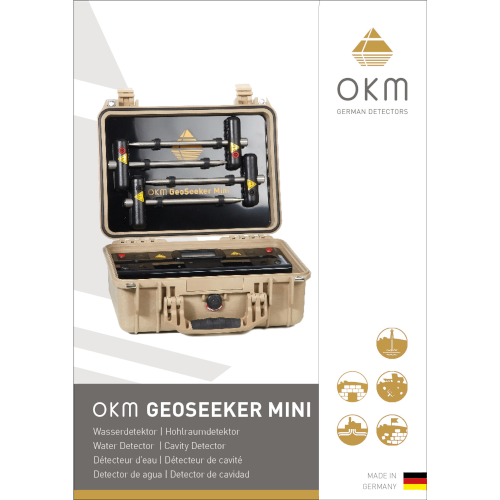
GeoSeeker Mini
Product Flyer
Languages: English, Deutsch, Français, Español
Last updated: January 15, 2020
File size: 619.63 kB








































